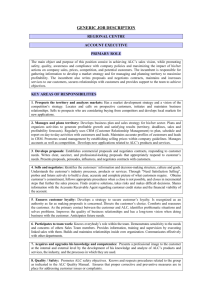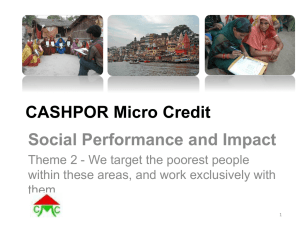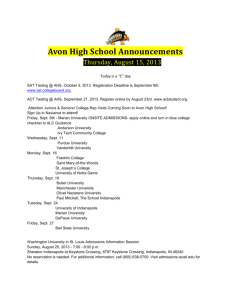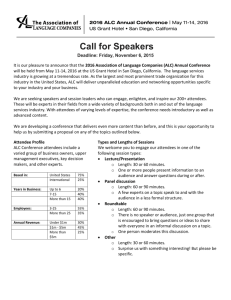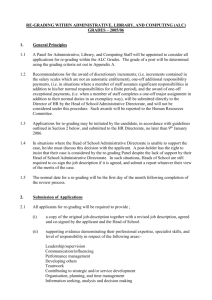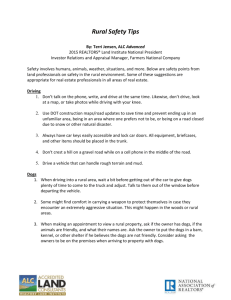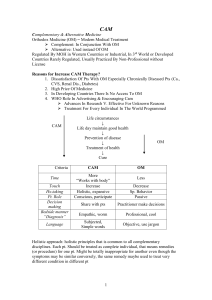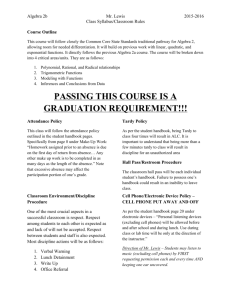Student Handbook
advertisement
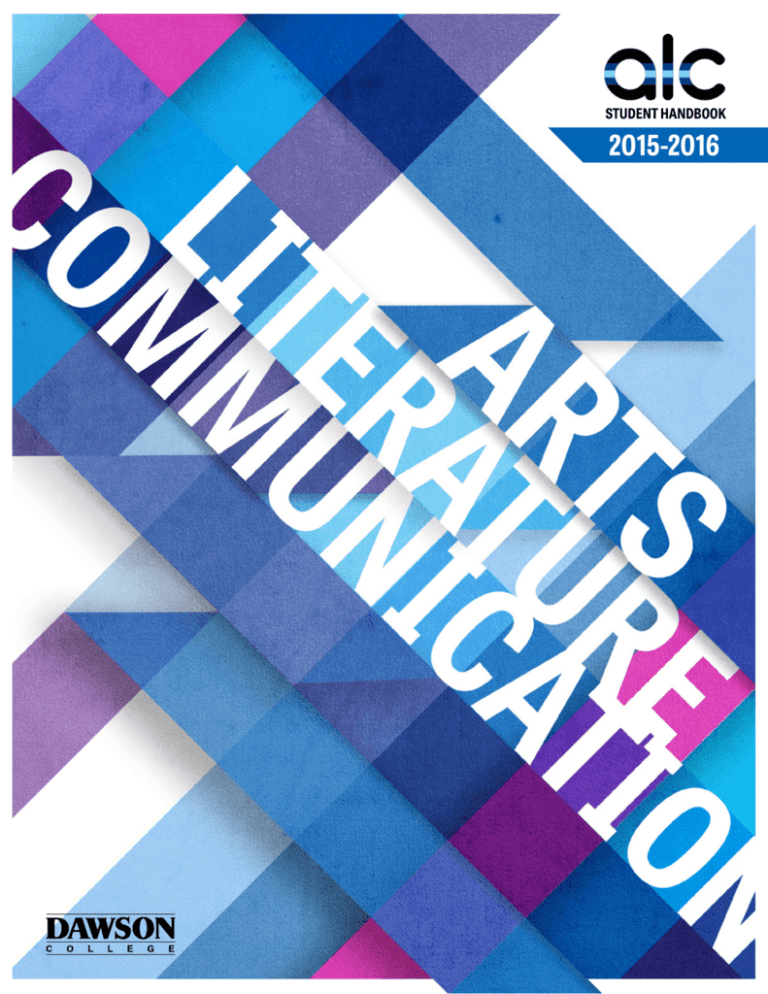
STUDENT HANDBOOK 2015-2016 TABLE OF CONTENTS WELCOME TO ALC....................................................................................................................................3 PROGRAM STRUCTURE: ARTS, LITERATURE AND COMMUNICATION (500.A1).......................................4 GENERAL EDUCATION & ALTERNATIVES ................................................................................................5 OUR SIX PROFILES & THEIR PROFILE REQUIREMENTS............................................................................8 ARTS & CULTURE PROFILE (500.G1).........................................................................................................9 CINEMA-COMMUNICATIONS PROFILE (500.G4)....................................................................................11 INTERACTIVE MEDIA ARTS PROFILE (500.G6)...................................................................................... 13 LANGUAGES PROFILE (500.G3).............................................................................................................. 15 LITERATURE PROFILE (500.G2)...............................................................................................................17 STUDIO ARTS (500.G5)........................................................................................................................... 19 GRADUATION REQUIREMENTS.............................................................................................................. 21 COLLEGE AND PROGRAM ACADEMIC AND ADVANCEMENT POLICIES.................................................. 22 ALC PROGRAM POLICIES.......................................................................................................................23 ‘’MINORS’’ IN JOURNALISM, MUSIC AND THEATRE..............................................................................25 THE ALC FESTIVAL .................................................................................................................................25 FREQUENTLY ASKED QUESTIONS..........................................................................................................26 *Click on any section to be redirected to that page Welcome, to the Arts, Literature and Communication (ALC) Program! Congratulations on your acceptance to the ALC program at Dawson College. We are delighted to welcome you into your particular profile and wish you the greatest success as you follow your studies through the next semesters. At this important time in your life, the ALC program offers you the opportunity to explore current interests and to develop new ones. We encourage you to take full advantage of all the choices before you and to try your hand at subjects you have never studied before. The ALC program prepares you for further education in a broad variety of arts-related fields including art history, cinema, communications, cultural studies, drama, education, fine arts, design, media studies, humanities, international careers, journalism, languages, the liberal arts, library studies, linguistics, literature, translation, and the visual arts. We in the ALC program hope that what you learn with us will stay with you for the rest of your life. It may be part of a career path or further studies, but whatever you decide to do after CEGEP, we hope that you will leave with a deeper understanding and appreciation of the arts, literature and-or communications and that your experience at Dawson will enhance your lives and future careers. Cheers! Nelly Muresan ALC Program Coordinator Room 4D.13.B 514-931-8731, ext. 1324 nmuresan@dawsoncollege.qc.ca STUDENT HANDBOOK PROGRAM STRUCTURE: ARTS, LITERATURE AND COMMUNICATION (500.A1) ALC (previously C.A.L.L. Creative Arts, Literature and Languages) is a pre-university program, currently the largest program in the Creative and Applied Arts (CAAA) sector at Dawson College with an enrollment of approximately 900 students. Each ALC Student is enrolled in one of the following six profiles: Arts & Culture Cinema-Communications Interactive Media Arts (IMA) Languages Literature Studio Arts To obtain a DEC in the ALC program you must complete a total of 56 2/3 credits: General Education Component: 26 2/3 Program Specific Education Component: 30 ALC Disciplines The following disciplines, identified by discipline numbers, are offered in the ALC program: • • • • • • • • • • • • • • • • • Art History (520) Music (550) Cinema-Communications (530) Interactive Media Arts (585) Philosophy (340) Religion (370) Computer Science (420) Studio Arts (511) Theatre (560) French (602) English (603) Spanish (607) Italian (608) German (609) Hebrew (611) Chinese (613) Greek (615) Click here for more information on the ALC Program 4 STUDENT HANDBOOK GENERAL EDUCATION & ALTERNATIVES Standard Option: To complete any CEGEP program you must take a combination of General Education and program-specific courses. The General Education portion of your studies consists of: • • 12 courses in the core disciplines of English, Humanities, French, and Physical Education Two complementary courses outside of your program/profile (see the College Timetable online for the list of the complementary courses you are permitted to take and the course descriptions) General Education Requirements English Introduction to College English (A) 603-101-04 Literary Genres (B) 603-102-04 Literary Themes (B) 603-103-04 Humanities Humanities: Knowledge 345-103-04 Humanities: Wold Views 345-102-03 Humanities: Ethical Issues (C) 345-BXH-03 French French: General Course (A) 601-10*-03 French: Adapted to the ALC Program (D) 102-B**-03 Physical Education Physical Education: Activity & Lifestyle Awareness 109-103-02 Leisure Activity Skills 109-104-02 Complementary courses 2 Complementary courses chosen from a list in the second and third terms (E) Click here for more information on the ALC Program Applied Themes in English (C) 603-BXE-03 Managing an Active Lifestyle 109-105-02 5 STUDENT HANDBOOK (A) French courses and the first credit English course are offered at different levels of ability. A placement test is given at the beginning of the first semester to determine your appropriate level. NB: There is a limit to the number of courses you may take each term. If you are placed in a noncredit English or French course, you will have to plan the remainder of your courses carefully in order to graduate on time (B) English courses must be taken in order, except for Literary Genres (102) and Literary Themes (103), which may be taken in either Term 2 or 3 (C) Some learning activities are adapted to students’ programs (D) You will be required to complete a French B-Block Projet spécifique that you must pass as part of your Comprehensive Examination (E) Students in the Arts and Culture, Literature, Cinema-Communications, Interactive Media Arts, and Studio Arts profiles must choose complementary courses (4 units in one or two) following domains: • • • • • • Social Science Science and Technology Modern Languages Math Literacy Computer Science Arts and Aesthetics (F ) Students in Languages must choose complementary courses from Arts and Aesthetics, Computer Science, Language of Mathematics, Science and Technology, Social Science, and from disciplines outside of their concentration. Click here or see College Timetable for the list of Complementary Courses you are permitted to take. Click here for more information on the ALC Program 6 STUDENT HANDBOOK Alternatives for General Education REFLECTIONS The special area of study known as Reflections provides a small-group, concentrated approach to studies in subjects that are central to the ALC curriculum. Students in ALC and other programs have the opportunity to take their core English and Humanities courses in Reflections, as well as courses in Literature, Religion (concentration courses), and Psychology (complementary courses). All Reflections courses are double-credit, giving students time to explore topics in greater depth. Classes are held in the Reflections Lounge, an inviting sitting room furnished with couches and plants, where students engage in lively discussions with their peers and teachers. Enrolment in Reflections is limited. Interviews for Fall admission are held in February and those for Winter admission take place in October. For more information or to arrange an interview, contact: Michael Duckett Coordinator of Reflections Office 4D.16 931-8731, ext. 1465 mduckett@dawsoncollege.qc.ca THE NEW SCHOOL Are you ready for something different? If so, you might want to register for English and Humanities courses at The New School. At The New School we believe that you learn best when you are truly motivated, when you have a say in what and how you will learn. In The New School English and Humanities classes, students and teachers develop the courses together. As a group you decide not only what you will learn, but also how you will go about it. The New School’s philosophy is based on the belief that each member of the community has much to contribute as well as much to learn at CEGEP. Because The New School is a small community with its own space within Dawson College, you will meet a variety of people from your own as well as other programs. The New School is a place where students have the space to address their academic, personal, and social needs in a friendly and accepting environment. To register for your English and Humanities courses at The New School, contact: Cory Legassic Coordinator of New School Room 8B.6 931-8731, ext. 1813 clegassic@dawsoncollege.qc.ca Click here for more information on the ALC Program 7 STUDENT HANDBOOK OUR SIX PROFILES & THEIR PROFILE REQUIREMENTS ARTS & CULTURE CINEMA-COMMUNICATIONS INTERACTIVE-MEDIA ARTS LANGUAGES LITERATURE STUDIO ARTS Click here for more information on the ALC Program 8 STUDENT HANDBOOK ARTS & CULTURE PROFILE (500.G1) Arts & Culture Profile (500.G1) Profile Coordinator: Amanda Cockburn Office 3D.5 931-8731, ext. 1287 acockburn@dawsoncollege.qc.ca Click here to go to the Profile Brochure Click here to go to the Course Descriptions Welcome to the Arts and Culture profile! Along with courses offered by all the other profiles in the ALC Program (Cinema-Communications, Interactive Media Arts, Languages, Literature, and Visual Arts), the Arts and Culture profile incorporates courses from such disciplines as art history, computer science, music, philosophy, religion and theatre. This breadth of options can lead to a number of opportunities for further study or career paths: humanities, international affairs, journalism, business, and many other fields in the creative arts sector. You’ll learn to avoid clichés in your creative writing classes, but I can’t help myself: the sky is the limit! The required foundational courses of Arts and Culture provide a multidisciplinary approach to the study of culture as it is understood as a practice of making meaning through artistic processes and critical inquiry. They will introduce you to the history of arts, philosophy and religion as means of understanding how culture is shaped and formed over time, from the theatre of ancient Greece to contemporary media arts. Meanwhile, the Integrating Activity course, which you will take in your last semester, asks students to integrate their skills and knowledge cultivated at Dawson in an interdisciplinary creative project. What excites me most about our profile is the opportunity it grants YOU to discover your untapped potential in various artistic and academic mediums. I encourage you to commit yourself to your two years of study with a spirit of adventure and exploration: push your limits by participating in a spectrum of courses. You might discover something new about yourself as a student and as a budding artist. Please don’t hesitate to contact me (email is best) if you have any questions or concerns during your program of study. Also, please check out our Arts and Culture Facebook page for exciting things going on about town. Click here for more information on the ALC Program 9 STUDENT HANDBOOK Arts & Culture Profile Requirements • • • • you must take six Profile Required courses (in the Term 3 and 4 courses you cannot take the same discipline twice) you must also take six ALC Choice courses you must choose two Program Option courses from Lists A through F. You cannot take two courses from the same list In order to graduate, all students must assume responsibility for and pass their B Block French class (Projet Spécifique) and their Integrating Activity class, both of which are elements of the Comprehensive Examination. Note for students who entered in January: If you entered the ALC Program in the winter semester (January), you will be ‘’out of synch’’ with the program for the duration of your studies and will therefore not have as broad a choice of courses as students who began in the fall. Click here for more information on the ALC Program 10 STUDENT HANDBOOK CINEMA-COMMUNICATIONS PROFILE (500.G4) Cinema-Communications Profile (500.G4) Profile Coordinator: Dipti Gupta Office 3A.1-9 931-8731, ext. 1255 dgupta@dawsoncollege.qc.ca Click here to go to the Profile Brochure Click here to go to the Course Descriptions Students in the Cinema-Communications Profile [CC] learn about the communication webs that connect society. From big data and social media, broadband and broadcast, to commerce and art, as well as institutional and personal relations, communication and related technologies form the central nervous system of the world we inhabit. To know about these things is to know something crucial about life today. The profile is designed to provide students with critical perspectives as well as creative, analytical skills necessary to competently engage, understand and participate in the communications-media nexus. Cinema-Communications provides a catalogue of both theoretical and practical courses in film studies, journalism, scriptwriting, video production, animation, multimedia, communication design and social media. A program of study built from profile and General Education courses well prepares students for a diversity of undergraduate programs. All ALC profiles share the mandate of enabling students to proceed to university. Students can choose a more general or specialized program of study. Cinema-Communications aims to provide students with general skills and knowledge that will permit them to move on to an array of undergraduate programs in the Arts, Humanities, as well as some Social and Applied Sciences such as Anthropology and Education. The program is also responsive to those students targeting directly related university programs such as Communications, Film Production, Journalism, Animation and numerous others. • • In the first term, required and choice courses introduce the student to some of the fundamentals of the Cinema-Communications domain, from the identification of objects of study, to methodology and creativity. During the following terms, required and elective courses in theory and production will deepen the students understanding of study approaches to the field, thereby allowing the student to frame their course and university choices to suit their particular interests and skills. Click here for more information on the ALC Program 11 STUDENT HANDBOOK • In the final semester, the required Integrating Activity course challenges the student to consolidate what they have learned in order to demonstrate their knowledge and creativity. It is not surprising that the takeaway for the committed, involved student is a profound sense of accomplishment and satisfaction. The Cinema-Communications faculty are committed to have students successfully and contentedly accomplish their journey. Students should know that instructors are ready to discuss any issues, interests and questions, all with the aim of making these four college terms the best and most engaging educational experiences to date. Never hesitate to contact a teacher to go over matters of significance to you. Cinema-Communications Profile Requirements • • • You must take six Profile Required courses [one or two per term] You must also take six ALC Choice courses and two Option courses, two of which must be in a different profile [ALC Choice course 2 and Option Course B] In order to graduate, all students must assume responsibility for and pass their B Block French class [Project Spécifique] and their Integrating Activity class, both of which are elements of the Comprehensive Examination. Note for students who entered in January: If you entered the ALC Program in the winter semester (January), you will be ‘’out of synch’’ with the program for the duration of your studies and will therefore not have as broad a choice of courses as students who began in the fall. Click here for more information on the ALC Program 12 STUDENT HANDBOOK INTERACTIVE MEDIA ARTS PROFILE (500.G6) Interactive Media Arts Profile (500.G6) Profile Coordinator: John Connolly Office 3B.3 931-8731, ext. 1266 jconnolly@dawsoncollege.qc.ca Click here to go to the Profile Brochure Click here to go to the Course Descriptions The pace of technological evolution is accelerating, transforming the ways in which we communicate, socialize, and view the world. The Interactive Media Arts (or “IMA”) profile will help you to make sense of these changes, and prepare you to creatively and meaningfully participate in the development of the technocultural landscape. It will also prepare you for the increasing number of interaction-related university programs that have emerged in recent years in the faculties of Fine Arts, Arts, Design, Communications, and Media Studies, among others. (For a list of related university programs please go to the After graduation IMA webpage). To accomplish all this, you will explore a number of related subject areas, using a variety of critical perspectives and creative approaches while delving into diverse areas of interactive media arts, such as: • • • • • • • • • • the cyberarts, net.art, and metacreation interactive music, sound and video art game design and gamification app design and mobile media tangible media / physical computing responsive objects, installations and environments participatory artworks human computer interaction and user experience simulations and modeling interactive data art and visualization The IMA profile is centered on creativity, from artistic self-expression to problem-solving; the underlying technologies are important only to the extent that they allow you to produce creative works, illuminate challenging concepts and issues, design enriching user experiences, or address problems of contemporary society. Click here for more information on the ALC Program 13 STUDENT HANDBOOK More information and photos and videos of IMA workshops and student projects can be found here: Official Dawson IMA web pages Facebook Tumblr Youtube Vimeo SoundCloud IMA Profile Requirements • • • • you must take six Profile Required courses you must also take six ALC Choice courses, either courses recommended by your profile or courses offered by another profile; one course from the ALC Choice List 2 has to be taken outside your profile. you must choose two Program Option courses in Term 3 and Term 4. You cannot choose two from the same list and if you choose an Option B course it has to be a course outside your profile. In order to graduate, all students must assume responsibility for and pass their B Block French class (Projet Spécifique) and their Integrating Activity class, both of which are elements of the Comprehensive Examination. Click here for more information on the ALC Program 14 STUDENT HANDBOOK LANGUAGES PROFILE (500.G3) Languages Profile (500.G3) Profile Coordinator: Nelly Muresan Office 4D.13-B 931-8731, ext. 1324 nmuresan@dawsoncollege.qc.ca Click here to go to the Profile Brochure Click here to go to the Course Descriptions “If you talk to a man in a language he understands, that goes to his head. If you talk to him in his own language, that goes to his heart.” ‒-Nelson Mandela Congratulations! I am thrilled that you’ve been accepted into our profile at Dawson College. As you know, we are unique in offering these six languages: Spanish, Italian, German, Greek, Hebrew and Chinese. You will have the opportunity to study two or three languages (depending on your entry level) other than English & French, one of which will be studied to the 4th level. In addition, you will enrich your knowledge of French through a 4th term course Questions d’identité, designed especially for you, and discover the fascinating world of Linguistics. In some of your required courses, you will also explore issues related to both cultural history and contemporary practices, aiming at a greater understanding and appreciation of today’s complex social and cultural realities. What can you do with a DEC in Languages? Having a DEC in Languages gives you access to many university fields such as linguistics, communications, literature, education, translation, interpretation, (international) business, journalism and so much more. Here are some examples of where our recent graduates have gone: TESL (Teaching English as a Second Language)/Concordia University, Gestion Publique/Université du Québec à Montréal, International Cooperation/Université de Montréal, Communication and Cultural Studies/ Concordia University, Secondary Education/McGill University, Psychology/McGill University, Major in Translation (English to French), Minor in German/Concordia University, Translation/Université de Montréal, Communications/Université de Montréal, Public Relations /Université du Québec à Montréal, etc. As you can see, a DEC in Languages gives you plenty of opportunities! It’s your space! Use YOUR Language Study Center (LSC) in 3E.2; this room is for you to practice your languages, make new friends, and seek help with homework and assignments. There are available computers and resource material for you to consult so feel free to visit anytime! Click here for more information on the ALC Program 15 STUDENT HANDBOOK Look us up on Facebook! Take a peek at our Dawson Modern Languages Facebook page that was created to help current and former students share very valuable information. Finally, never hesitate to contact me or drop by during my office hours if you have any questions or concerns during your program of study. Languages Profile Requirements • • • • you must take 6 Profile Required courses: one of the Required courses is a French course called Questions d’identité (in addition to two General Education French Courses), and one is a Linguistics course. you must take 6 Languages Courses: one of which must be the 4th level of one language (Spanish, Italian or German) and two consecutive courses in any of the other languages you must also take 3 ALC Choice courses In order to graduate, all students must assume responsibility for and pass their B Block French class (Projet Spécifique) and their Integrating Activity class, both of which are elements of the Comprehensive Examination. Note for students who entered in January: If you entered the ALC Program in the winter semester (January), you will be ‘’out of synch’’ with the program for the duration of your studies and will therefore not have as broad a choice of courses as students who began in the fall. Click here for more information on the ALC Program 16 STUDENT HANDBOOK LITERATURE PROFILE (500.G2) Literature Profile (500.G2) Profile Coordinator: Liana Bellon Office 3D.9 931-8731, ext. 1290 lbellon@dawsoncollege.qc.ca Click here to go to the Profile Brochure Click here to go to the Course Descriptions “There will be details of explanation, especially with poems written in another age than ours, matters of fact, historical allusions, the meaning of certain words at a certain date, which can be established and the teacher can see that his [or her] pupils get these right. But as for the meaning of the poem as a whole, it is not exhausted by explanation for the meaning is what the poem means to different sensitive readers.” -T.S. Eliot (Modernist poet) “To have a sense of creative activity is the great happiness and the great proof of being alive.” -Matthew Arnold (Victorian poet and literary critic) “The writer wants to leave that scratch on the wall of oblivion that someone a hundred or a thousand years later will see.” -William Faulkner (American novelist) The aim of the Literature Profile is to prepare students for university studies in English literature, journalism, drama, history, or law, and careers in teaching, writing, editing, and publishing. While literary study offers students a chance to improve critical thinking and writing skills, it is also a discipline in its own right. Students in the Literature Profile enjoy reading, discussing, and analyzing literary texts. Along with their four English classes (101, 102, 103, and BXE), the students in the profile take many Click here for more information on the ALC Program 17 STUDENT HANDBOOK other literature courses, each of which focuses on developing writing and analytical skills through the in-depth study of various literary texts. Literature Profile students can opt to take a minor in Journalism. The courses that are part of this minor are: Writing News Stories, Writing Feature Stories, Journalism and the Web, and Ethics of Journalism. Having developed critical thinking skills, and the ability to write well and edit meticulously, graduates find themselves well prepared for university studies. Our graduates have pursued studies in, among others, English, History, Philosophy, Communications, Law, and Education. Creations Literary Journal Since 2001, Dawson’s Creations Literary Journal has been an annual anthology of students’ creative and academic work. Although many student publications are now online, Creations continues to be a handheld book that serves as a yearbook of sorts for each graduating class. The journal also welcomes work from students in first-year courses. Edited by graduating students in the Literature Profile, the journal features poetry, short fiction, dramatic pieces, photography, drawings, essays, and other original work. For many aspiring writers and artists, the journal offers a valuable opportunity to submit creative pieces and benefit from the feedback of an editorial team. For those interested in the publishing world, Creations provides the chance to develop one’s critical eye and participate in organizing a book launch, often held during the spring Arts festival. Submissions and requests to work as student editors can be sent to: Liana Bellon, Literature Profile Coordinator lbellon@dawsoncollege.qc.ca Literature Profile Academic Conference As part of the final-term Integrating Activity course, students present their major papers at the Literature Profile Academic Conference. Literature Profile Requirements • • • • you must take six Profile Required courses you must also take six ALC Choice courses, either courses recommended by your profile or courses offered by another profile; one course from the ALC Choice List 1 has to be taken outside your profile. you must choose two Program Option courses in Term 3 and Term 4; for Option A you can take any course while for Option B you have to choose a course outside your profile. In order to graduate, all students must assume responsibility for and pass their B Block French class (Projet Spécifique) and their Integrating Activity class, both of which are elements of the Comprehensive Examination. Click here for more information on the ALC Program 18 STUDENT HANDBOOK STUDIO ARTS (500.G5) Studio Arts (500.G5) Profile Coordinator: Julianna Joos Office 3G.11 931-8731, ext. 3306 jjoos@dawsoncollege.qc.ca Click here to go to the Profile Brochure Click here to go to the Course Descriptions Studies in the Studio Arts Profile offer students the possibility of tailoring a program to advance their own specific interests and skills. Studio art courses form the central focus, complemented by ALC Choice and Option courses chosen from a wide variety of disciplines such as Cinema, Literature, Music, Theatre, Languages and French Literature. A special feature of the Studio Arts Profile is the number of choices of different art media available. From printmaking and painting to computer art, drawing, sculpture, and artists’ books, creativity takes many forms. Our teachers are committed art academics as well as practicing artists who take pride in their creative work, exhibiting in the city and abroad. At Dawson we reach out to look at art in the real world, visiting galleries and museums. Our art history and studio courses examine art of the past and the present, helping students to understand their work in the broader context of ideas in art today. The Studio Arts Profile of the ALC Program does not require a portfolio for admission. Students graduating from this profile continue on to studies in art education, art therapy, art history, aesthetics, film and theatre set design, museum studies, digital arts, animation, graphic design, theatre set design, and media and visual communication. All courses in Studio Arts lead to one’s Comprehensive Examination in the final semester. This consists of a self-directed project in the Integrating Activity course. The project will reflect your intellectual and artistic development and will be included in the graduating student exhibition. Many find creating this project, exhibition, and exhibition catalogue to be a stimulating experience that brings their work to a more professional level. The gathering together of family and friends at the final exhibition vernissage celebrates your efforts and learning as you leave our program. Click here for more information on the ALC Program 19 STUDENT HANDBOOK Studio Arts Profile Requirements • • • • you must take six Profile Required courses you must also take six ALC Choice courses, either courses recommended by your profile or courses offered by another profile; one course from the ALC Choice List 2 has to be taken outside your profile. you must choose two Program Option courses in Term 3 and Term 4. You cannot choose two from the same list and if you choose an Option B course it has to be a course outside your profile. In order to graduate, all students must assume responsibility for and pass their B Block French class (Projet Spécifique) and their Integrating Activity class, both of which are elements of the Comprehensive Examination. Note for students who entered in January: If you entered the ALC Program in the winter semester (January), you will be ‘’out of synch’’ with the program for the duration of your studies and will therefore not have as broad a choice of courses as students who began in the fall. Click here for more information on the ALC Program 20 STUDENT HANDBOOK GRADUATION REQUIREMENTS All students in the ALC Program must pass the Comprehensive Examination in order to graduate. All components of the Comprehensive Examination must be successfully completed in order for students to obtain a ‘’pass’’ standing. Comprehensive Examination Components • • • The Integrating Activity (IA) course The Projet Spécifique that is carried out in your Block B French course (details on your French Course Outline) The level 4 language course of your choice (Italian, German or Spanish) for Languages Profile Students ONLY Integrating Activity Course (IA) All students in the ALC Program will take a course titled Integrating Activity (IA) in their final term. In the Integrating Activity Course, under the guidance of a teacher, you will work on a major project that will consist primarily of the development, production, and evaluation of a creative or critical work. The project will provide you with opportunities to demonstrate your creativity, and your ability to integrate knowledge, skills and objectives you have attained in both Specific Education and General Education courses. Research and interpretation skills, innovation and critical thinking skills will also be assessed in this course. Projet spécifique (special project) The projet spécifique is a major part of the second required credit French course (B Block course) and counts for approximately 30% of the student’s final grade. It is also a component of the Comprehensive Assessment for students in Science programs as well as in the ALC and C.A.L.L. Programs. Students choose a topic related to their field of study or future occupation and French teachers decide if the chosen topic is appropriate for the projet spécifique. The aim of the projet spécifique is to verify that students master the objectives and French terminology related to their programs of study. To satisfy this requirement, individual students deliver an oral presentation on a fairly specialized topic and also submit a relevant written assignment in proper idiomatic French. Students receive both a number grade and a Pass or Fail grade (based on 60%=Pass) for their projet spécifique. The number grade will count toward their French course grade, and the Pass or Fail will count as one of the components in their CE grade if applicable. Click here for more information on the ALC Program 21 STUDENT HANDBOOK COLLEGE AND PROGRAM ACADEMIC AND ADVANCEMENT POLICIES To be in good standing and to register unconditionally, students must meet the requirements of the College Academic Standing and Advancement policy, as well as the Program requirements. COLLEGE POLICY Academic Standing To be in good standing and to register unconditionally: • Students must have passed more than 50% of their courses for the year (not including summer school) • Students admitted in January must pass more than 50% of their courses in that semester • Students must also meet the standards of their particular program. If that policy is more stringent than the College policy, the program policy (DEC or AEC) takes precedence Students who do not fulfill the above conditions may register only with the permission of the Academic Standing Appeals Committee. Students denied permission to register under this section have a right to appeal to the College Academic Standing Appeals Committee. PROGRAM POLICY Academic Standing To be in good standing and to register unconditionally in the Arts, Literature and Communication (ALC) Program, students must have passed: • Students must pass at least four (4) of the Specific Education courses in the year. • Students must pass at least four (4) General Education courses in the year. • Students admitted in January must pass at least two (2) of the Specific Education courses in that semester and at least one General Education Course in that semester. • Advancement Advancement is contingent upon meeting the Academic Standing Policy of the College and the Program. Students who do not satisfy the criteria of this Academic Standing and Advancement Policy will be expelled from the program and the college. The expelled student has the right to appeal the expulsion to the Academic Standing Appeals Committee. Students not taking any courses in a semester must reapply to the College by the application deadline. Exceptional Circumstances In extenuating circumstances, the Program Coordinator may recommend an exception to the Program Academic Standing and Advancement Policy to the Program Dean. Click here for more information on the ALC Program 22 STUDENT HANDBOOK ALC PROGRAM POLICIES LITERACY When submitting course work in the English language, students are expected to adhere to college-level standards of literacy and presentation and to follow a standard academic documentation style such as MLA or APA. ATTENDANCE Presence and participation are necessary components of learning. Students who fail to attend or participate in classes may jeopardize their successful completion of the course and fail to fulfill the course objectives. Some courses have a participation grade. However, even in those which do not, it should be clear that you lean more by attending classes than by cutting them. CELL PHONES, LAPTOPS AND OTHER DIGITAL DEVICES The ALC Program prohibits the use of cell phones in all classrooms, studios, and resource rooms. Cell phones must be turned off and put away before entering any of these areas, and while attending field trips and other class activities. This means that students may not monitor calls, check websites, or send or receive text messages, images, or voice recordings during any class activities. The use of laptop computers in classes that allow them must be restricted to course work. CHEATING AND PLAGIARISM Both academic research and creative production are based on intellectual honesty and artistic integrity. Therefore, any act of plagiarism – the unacknowledged use of source material – may result in a failing grade for the project or assignment. Moreover, it is the student’s responsibility to ensure that other students do not make unauthorized use of his or her work. For the full college policy regarding cheating and plagiarism, consult the Institutional Student Evaluation Policy (ISEP) on the Dawson website. Departmental standards and mechanisms regarding cheating and plagiarism will apply to courses listed under specific disciplines. In the case of the Integrating Activity and Comprehensive Examination, the cheating and plagiarism policy applied will be that of the department to which the faculty member offering the course belongs. PROFILE / PROGRAM TRANSFER At the end of the first term, it is still possible to transfer from one profile to another; however, space may be limited. You may transfer between the Arts and Culture, Literature, Cinema/Video/Communications, Visual Arts and Interactive Media Arts profiles. Your first-term courses can be applied to all profiles except Languages. If you are in the Languages profile and wish to transfer into any other Creative Arts, Literature, and Languages profile, you will be required to make up some credits. Please contact an Academic Advisor and the appropriate Profile Coordinators if you are considering a transfer. If you wish to transfer from one profile to another, you must request a form and fill it out by a deadline set by the Registrar’s Office. Inquire there for further information each term. Click here for more information on the ALC Program 23 STUDENT HANDBOOK PORTFOLIOS Starting from your first term in the program, keep all your work and creative projects in a portfolio. This will be useful for the Integrating Activity course and for university admission. The practice of keeping a portfolio will allow you to have immediate access to all your work for further projects and submissions. Click here for more information on the ALC Program 24 STUDENT HANDBOOK ‘’MINORS’’ IN JOURNALISM, MUSIC AND THEATRE Students in the ALC Program will have access to a ‘’minor’’ in the subject area of Journalism, Music and Theatre. Click here for more details on the ‘’Minors’’: If you successfully complete all four courses in one of the Journalism, Music or Theatre ‘’minors’’ you may acquire a letter of recognition from the Program Dean that signifies your achievement of a ‘’minor’’. This minor is available to students of all profiles except Languages and could be especially useful to students who wish to continue in Journalism or Communications programs at a University level. THE ALC FESTIVAL Participate in the ALC Festival! The annual ALC festival is an integral element of the Arts, Literature, and Communication. The objective of this festival is to celebrate the achievements of ALC students, while introducing their academic and creative work to fellow Dawson students and to the college community at large. In showcasing the works of ALC students in their respective fields, the festival celebrates their accomplishments, hard work, and talent beyond the classroom, and highlights the college’s commitment to student success. The ALC Festival also offers you the opportunity to gain valuable experience in event organization. If you are interested in helping to organize the festival, contact your profile coordinator, or: Laura Mitchell ALC Festival Coordinator Room 3D.3-3 lmitchell@dawsoncollege.qc.ca Click here for more information on the ALC Program 25 STUDENT HANDBOOK FREQUENTLY ASKED QUESTIONS Do I have to attend all my classes? The answer to that is a loud, resounding “YES!” unless you have been excused for a good reason students are often evaluated on the basis of their attendance and participation in class. Clearly, if you’re not there, you can’t participate. It you know you will have to miss a class for an acceptable reason, speak to your teacher in advance. If you miss a class, it is your responsibility to catch up before the next class, either by asking other students or, better yet, by contacting your teacher. What if I’m late for an assignment or miss an exam or test? Each teacher states a policy on late assignments and absences in his or her course outline. Some teachers give an automatic zero for a missed test or assignment; others may take off marks. If you can’t make it to class to bring in an assignment, ask a friend or class mate to bring it in. Don’t forget, you can always hand in work early. The best policy is to anticipate the situation and speak to your teacher in advance. Don’t leave anything to the last minute. What if I suddenly realize I’m in the wrong program or profile? First of all, don’t simply drop out: you can always use some of those credits. Share your concerns with one or two of your teachers; they will offer suggestions. If you know you’d like to transfer to another profile or program, make an appointment with an Academic Advisor (in Room 2D.4) who will review your options with you. What can I do if I’m stressed and can’t keep up with all my work? Before the course drop deadline, decide if you can manage your workload. Take a good look at all of your courses, and determine which are causing you the most stress. It’s better to officially drop a course than to hang in and fail it, or simply to drop out without telling anyone. Unless a course is dropped officially, your mark for it (which could be a zero) appears on your transcript and is counted in your average and R-score. It might be worthwhile to talk about your situation with a teacher, but you should see an Academic Advisor who can help you make a decision and can drop your course officially. What should I do if the reading or writing assignments in a class are too challenging for me? Don’t panic or give up. You just need help and there are many ways of getting it. You can ask your teacher for help, and you can also get lots of help at the Academic Skills Center, Room 4E.3. If you know someone who is very successful in the course, you might also ask him or her for help. What do I do if I’m feeling depressed, overwhelmed by my school work, my job, my family and friends, and I feel I can’t cope anymore? You might talk to a teacher whom you trust, or you might want to see someone in Dawson’s Counselling Service. You can call to make an appointment with Counselling by phoning (extension 1206) or you can just drop by the office (Room 2D.4). Many students have found the counselling service to be very helpful. Click here for more information on the ALC Program 26 STUDENT HANDBOOK What if I feel a teacher doesn’t like me and isn’t treating me fairly? Talk with your teacher. If you feel the teacher hasn’t marked you fairly or has picked on you in class, find out why this has happened. Stay calm and polite and you will be treated with respect. If, however, you are not satisfied with the outcome, the next person to speak to is the department chair. If that is not satisfactory, make an appointment to speak to the sector Dean. If the issue is related to how your work has been marked, it is your right to have a grade review. The Institutional Student Evaluation Policy (ISEP), available on the Dawson web site, outlines processes for students’ complaints. Be assured, though, that the best recourse is to settle matters with the teacher before they escalate into an academic grievance. What does “plagiarism” mean? Plagiarism is when you present someone else’s work or ideas as your own. It could be work or an idea in writing, but it could be in any other form as well: film, art, oral, etc. This happens when you do not cite a source in your own work. If you copy entire passages or even one line or one idea from books or web sites without acknowledging your sources, you are guilty of plagiarism. Submitting work done by another student or bought through an essay writing service is also plagiarism. If you are caught, you will most likely receive a zero for the assignment and you risk being expelled from Dawson College. It is a good idea to look up Dawson College’s policy on plagiarism in the Institutional Student Evaluation Policy (ISEP) which you can see on the Dawson web site. It is also wise to understand each of your teacher’s policies regarding plagiarism. How can I keep all the balls in the air: school, work, friends? You are not alone; many students have this problem. First, think about your budget. How much money do you need per week? What are your sources of income? What can you afford and what can you not afford? Then, look at your schedule. Most of your courses require three hours of homework a week. If you are taking seven courses a semester, add 21 hours of homework in addition to the hours of class time. That does not leave an enormous amount of time for part-time work. If you need to work, don’t work more hours than you need; it has been shown that after 12 hours a week on the job, many students’ marks begin to drop. Sometimes it’s wise to take fewer courses each term, although you might need an extra term or year to complete your DEC. Be realistic. You must go to class, you must study and complete all required assignments, and you should also reward yourself for your hard work. When you start planning your personal schedule, plan for work, for school, and for fun. Finally, don’t leave anything to the last minute. Plan out your term, keeping in mind all deadlines and exam dates. The moment you get an assignment, begin working on it. You will be less overwhelmed when deadlines begin to pile up. Is getting a DEC worth all the hard work? Of course it is. CEGEP is an important part of the education of pre-university students, and it also rounds out the education of students who have other plans after CEGEP. In the ALC program, you have the chance to explore many different areas of knowledge and creativity. You also have the opportunity to meet other students who share your interests and who come from different backgrounds. Your knowledge of the world and of other people will expand. Be sure to get involved in fun projects, in extra-curricular activities that interest you, and in new friendships. This should be a memorable time in your life! Click here for more information on the ALC Program 27
